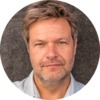26 November 2020, 10 am - 1 pm, live from the Nikolaisaal!
Europe will become climate-neutral by 2050 - a goal set by the Green Deal, thus taking a significant step towards transforming Europe into a more climate-friendly future. The EU Commission's programme promises a paradigm shift towards dependable decisions for a Europe of the 21st century, which again clearly prioritises its climate and environmental objectives after the corona crisis has been overcome. Joined efforts are needed to make the cultural sector an indispensable and sustainable driver and innovator of European societies - and this could be the great opportunity of culture! The innovative power and ambitions of art as a valuable resource in the fight against climate change and societal crisis seem more precious than ever. Where does the cultural sector find its place in the challenges following the pandemic? What measures and investments are necessary for a sustainable cultural sector and a climate-friendly cultural industry of the future?
The digital main forum enlivens one of the three main topics Climate, Crisis & Culture, Democracy & Culture and Participation & Culture with interactive discussions, expert moderators and top speakers.
1st Panel 10:00 - 10:45 am
Challenge Climate Change!
The past months have catapulted the European cultural market into an incomparable crisis. At the same time, climate change is challenging our society with far-reaching consequences for aesthetic practice and cultural management. In order to understand the crisis as an opportunity for a sustainable restart, drastic rethinking is required in the course of a holistic transformation process of the European cultural market. Which political concepts have been developed in order to deal with global challenges? Which cultural-political and scientific key elements are necessary? How can investment needs be formulated in order to guarantee a sustainable change in culture?
|

|
Robert Habeck
Federal President of Green Party
|
|
|
|

|
Prof. Dr. Dr. Hans Joachim Schellnhuber
Director Emeritus of the Potsdam Institute for Climate Impact Research
|
|
|
 |
Dr. Sabine Schormann
Documenta, General Director
|
|
|
2nd Panel 11:00 - 11:45 am
Sustainable Cultural Transformation
Climate change and the associated ecological, economic and social consequences also pose new challenges for the European cultural market. Since public and private cultural funding continues to be a key pillar of cultural funding, the connection of funding criteria with aspects of sustainability will be an essential part of the sustainable development of the cultural market in the future.How can cultural institutions and activities be checked with regard to their resource efficiency, climate impact and resilience?
|

|
Michelle Müntefering (requested)
Minister of State for International Cultural politics at the Foreign Ministry, Member of Parliament
|
|
|
|

|
Dr. Stephan Muschick
innogy Foundation, Managing Director
|
|
|
|

|
Dr. Stefan Körner
Stiftung Fürst-Pückler-Museum Park & Schloss Branitz, CEO
|
|
|
3rd Panel 12:00 - 12:45 pm
Green New Culture Deal
Sustainable cultural policy should aim to accompany an ecological transformation process in the cultural field and to support actors and initiatives in sustainable cultural production. Although numerous cultural institutions and initiatives now attach great importance to resource-conserving and environmentally friendly cultural work, it is only when the global climate goals are broken down to the operational level that sustainable change can be achieved holistically. Which structures are required for this in public and private cultural institutions?
|

|
Noosha Aubel
Member of the Bundestag, Cultural Policies Spokesman for the Green Party
|
|
|
|

|
Erhard Grundl
Member of the Bundestag, Cultural Policies Spokesman for the Green Party
|
|
|
 |
Bettina Jahnke
Hans Otto Theater, Artistic Director
|
|
|
Subject to changes.
A change to the parallel forums is possible at any time.
Back to overview